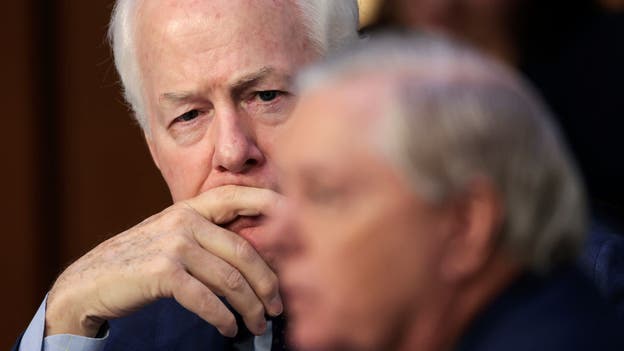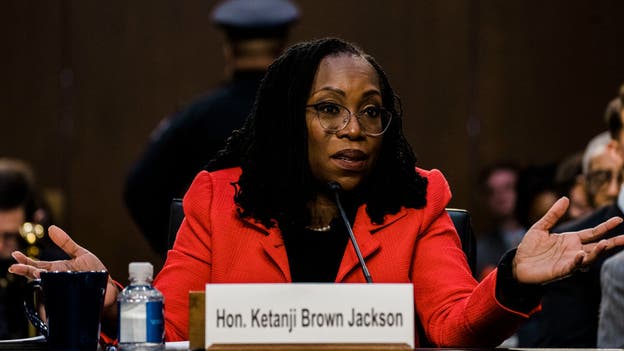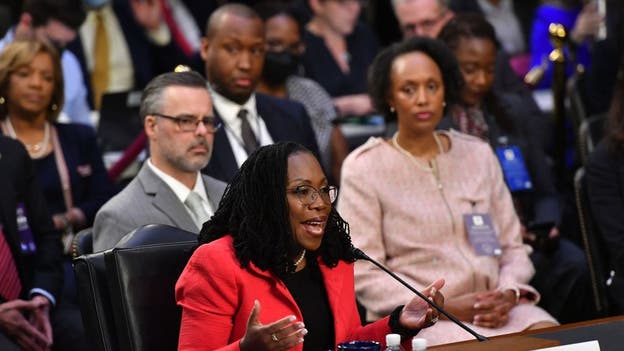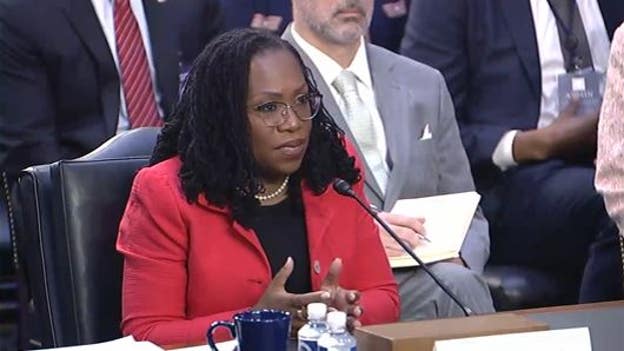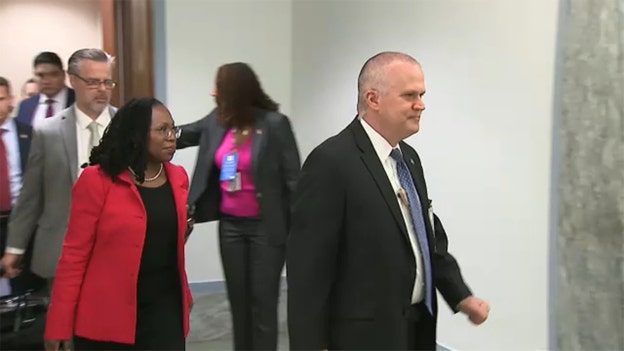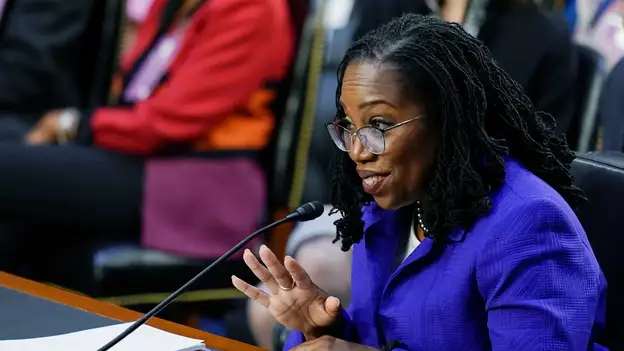Biden's Supreme Court pick Ketanji Brown Jackson testifies for second day: LIVE UPDATES
President Joe Biden's Supreme Court nominee Ketanji Brown Jackson will testify before the Senate Judiciary Committee again on Tuesday, continuing a 4-day hearing process.
Coverage for this event has ended.
Sen. Josh Hawley, R-Mo., questioned President Biden's Supreme Court nominee Judge Ketanji Brown Jackson on Tuesday over her sentencings for child pornography offenders that some have argued were too lenient.
Referencing a case in which she sentenced an 18-year-old to only three months in federal prison on prepubescent child pornography charges that Jackson conceded were "heinous" and "egregious," Hawley pinpointed elements of her ruling that made him question who she thought the victim in the case was.
"You also said to this individual, who is an adult—tried as an adult, 18 years old—you also said to him, besides saying that you thought his victims were his peers, you also said, 'There's no reason to think that you are a pedophile,'" Hawley asked.
Hawley further said he needed help understanding Jackson's point of view when she wrote, "This is a truly difficult situation. I appreciate that your family's in the audience. I feel so sorry for them, and for you and for the anguish this has caused all of you. I feel terrible about the collateral consequences of this conviction."
"And then you go on to say sex offenders are truly shunned in our society," Hawley went on, adding, "I'm just trying to figure out, judge, is he the victim here or the victims the victims?"
Click here to read more
Supreme Court nominee Judge Ketanji Brown Jackson said that she is unable to define what a woman is.
During the waning hours of her confirmation hearing Tuesday, Jackson was asked by Sen. Marsha Blackburn, R-Tenn., to provide a definition for the word "woman."
"Can I provide a definition?" Jackson said. "No. I can't."
"You can't?" Blackburn asked, to which Jackson replied, "Not in this context, I'm not a biologist."
During previous questioning from Sen. John Kennedy, R-La., Jackson also claimed she doesn't know when life begins or when the rights guaranteed by the U.S. Constitution become applicable to a person.
Republicans on Capitol Hill are expressing frustration with Senate Democrats and alleging that key documents related to the confirmation process of Judge Ketanji Brown Jackson have not been shared with them.
Fox News anchor Shannon Bream reported Tuesday that Republicans are expressing "outrage" over how long Democrats have been in possession of "sealed documents" related to Jackson’s record and have alleged that key documents have not been shared with them in a timely manner.
Click here to read more
Supreme Court nominee Judge Ketanji Brown Jackson said Tuesday she doesn't know when life begins or when the rights guaranteed by the U.S. Constitution become applicable to a person.
"When does life begin, in your opinion?" asked Sen. John Kennedy, R-La.
"Senator, I don't know," Jackson replied, adding, "I have personal religious and otherwise beliefs that have nothing to do with the law, in terms of when life begins." She went on to say that she sets aside her personal views on the issue when she is ruling on cases.
Kennedy further pressed Jackson to explain when she believes equal protection of the law attaches to a human being, to which she responded, "I actually don't know the answer to that question, I'm sorry."
Fox News chief legal correspondent Shannon Bream reported on the pressure Supreme Court nominee Judge Ketanji Brown Jackson is facing to define her judicial philosophy on "Special Report."
Judge Ketanji Brown Jackson said she’s “not sure” if critical race theory (CRT) is being taught at Georgetown Day School, an elite private Washington, D.C., school where she serves on the board of trustees.
During his questioning of Jackson, Sen. Ted Cruz, R-Texas, said he found it “a little hard to reconcile” Jackson’s previous comments about CRT and the fact that she serves on the board of a school that promotes the concept.
Jackson said the board does not control the curriculum and she was not aware of the theory being taught there.
“I don't know, because the board is not the board does not control the curriculum,” she said. “The board does not focus on that. That's not what we do as board members. So I'm actually not sure.”
“I do not believe that any child should be made to feel as though they are racist or though they are not valued, or though they are less than, that they are victims, that they are oppressors,” she said. “I don't believe in any of that.”
Judge Ketanji Brown Jackson gave her definition of critical race theory (CRT) during questioning by Sen. Ted Cruz, R-Texas, on Tuesday and said it is a theory she has "never" relied on in her career.
"My understanding is that critical race theory is it is the academic theory that is about the ways in which race interacts with various institutions," she said. "It doesn't come up in my work as a judge. It's never something that I've studied or relied on, and it wouldn't be something that I would rely on if I was on the Supreme Court."
Cruz went on to claim that CRT "frames all of society as a fundamental and intractable battle between between the races" and that it "views every conflict as as a racial conflict."
"Do you think that's an accurate way of feeling society in the world we live in?" he asked Jackson.
"Senator, I don't think so, but I've never studied critical race theory and I've never used it," Jackson responded. "It doesn't come up in the work that I do as a judge."
Republican Sen. John Cornyn and Democratic Sen. Cory Booker agreed that the Supreme Court confirmation hearings of Judge Ketanji Brown Jackson have been civil so far.
“I think everybody's pretty much behaving themselves,” Cornyn told Fox News on Day Two of the hearings.
“Everything has been well within the bounds,” Booker told Fox News, “and I think it's going to continue to be very good hearing.”
Sen. Marsha Blackburn, R-Tenn., a member of the Senate Judiciary Committee, appeared on Fox News during a brief recess of Judge Ketanji Born Jackson's confirmation hearing.
“We are going to give her a very thorough vetting,” Blackburn told “America Reports” co-anchor Sandra Smith. “What you’re seeing carrying forward is how a hearing ought to be carried forward for a Supreme Court Justice.”
Blackburn added on Twitter that the American people have a “right to know the policies and ideology of a nominee for the highest court in our land.”
Sen. Lindsey Graham, R-S.C., asked a number of personal questions to Supreme Court nominee Judge Ketanji Brown Jackson during her confirmation hearing on Tuesday, not out of concern for what her answers might be, but to make the point that they are irrelevant, despite being used in the past by Democrats for Republican-appointed nominees.
After asking Jackson about her religion and degree of faith, Graham recognized that this line of questioning was inappropriate for a judicial confirmation. The Republican referenced the confirmation processes of Justices Amy Coney Barrett, whose religious adherence was made an issue by the media, and which had been raised as an issue of concern by senators during her Seventh Circuit confirmation hearing.
"We're tired of it, and it's not going to happen to you," Graham said. "But it just appalls me that we can have such a system in America that if a conservative woman wants to stand out and say, I love my family, just as much as you love yours, and my faith means just as much to me as it does you, that all of a sudden they're some kind of weirdo."
Click here to read more on Fox News.
White House Deputy Press Secretary Andrew Bates mocked Sen. Josh Hawley, R-Mo., by tweeting a .gif from National Lampoon's "Animal House" Tuesday afternoon.
Bates' tweet included a National Review opinion article saying the child-pornography cases that Hawley has raised questions about actually show that Supreme Court nominee Ketanji Brown Jackson is an "unremarkable sentencer."
Judge Ketanji Brown Jackson said she doesn’t “quite remember the basis” for the Dred Scott decision of 1857, which declared that people of African descent were not U.S. citizens.
Jackson made the comment during questioning by Sen. John Cornyn, R-Texas , who said the Dred Scott decision, “which treated slaves as chattel property, was a product of substantive due process.”
Jackson responded, “The justices have interpreted the due process clause of the 14th Amendment to include a substantive provision, the rights to due process, they have interpreted that to mean not just procedural rights relative to government action, but also the protection of certain personal rights related to intimacy and autonomy. They include things like the right to rear one's children. I believe the right to travel, the right to marriage, interracial marriage, the right to an abortion, contraception—“
“Treating slaves as chattel property?” Cornyn interjected.
“I don't quite remember the basis for the Dred Scott opinion, but I'll trust you, that that’s—" Jackson said.
“The fact is,” Cornyn interrupted, “is it not that you can use substantive due process to justify basically any result?”
“The court has identified standards for the determination of rights under the Fourteenth Amendment, substantive due process," Jackson replied.
Judge Ketanji Brown Jackson dodged questions about court-packing from senators saying she'd follow the lead of Supreme Court Justice Amy Coney Barrett and not wade into policy matters during her confirmation hearings before the Senate.
Sen. Dick Durbin, D-Ill., prefaced a question to Jackson about court-packing by reading a quote from 2020 when Barrett declined to answer questions on controversial public policy matters.
"I will not express a view on a matter of public policy, especially one that is politically controversial because that is inconsistent with the judicial role," Barrett said in 2020, according to Durbin.
Click here to read more on Fox News.
Judge Ketanji Brown Jackson declared that Roe v. Wade and Planned Parenthood v. Casey are “the settled law of the Supreme Court.”
During Tuesday confirmation hearing, Sen. Dianne Feinstein, D-Calif., asked the Supreme Court nominee whether she agreed with Justices Brett Kavanaugh and Amy Coney Barrett that Roe v. Wade is settled as a precedent and has been reaffirmed multiple times, including in the Casey case.
“I do agree with both Justice Kavanaugh and Justice Barrett on this issue,” Jackson said. “Roe and Casey are the settled law of the Supreme Court concerning the right to terminate a woman's pregnancy.
“They have established a framework that the court has reaffirmed, and in order to revisit, as Justice Barrett said, the Supreme Court looks at various factors, because stare decisis is a very important principle,” she continued. “It provides and establishes predictability, stability. It also serves as a restraint in this way on the exercise of judicial authority because the court looks at whether or not precedents are relied upon, whether they're workable, in addition to whether or not they're wrong, and other factors as well.”
Asked whether she believes Roe v. Wade has the status of being a “super precedent,” Jackson said “all Supreme Court cases are precedential” and “their rulings have to be followed.”
Judge Ketanji Brown Jackson was quick to address questions about her record brought up by Republicans during her Supreme Court confirmation hearing Tuesday, including accusations that she has gone easy on defendants in child pornography cases.
The issue had been brought up by Sen. Josh Hawley, R-Mo., during the first day of the hearing on Monday, with the senator informed Brown that he would be asking her about certain cases in which she imposed sentences below federal guidelines, accusing her of being soft on child pornography offenders.
"As a mother and a judge who has had to deal with these cases, I was thinking that nothing could be further from the truth," Jackson said Tuesday, noting that "[t]hese are some of the most difficult cases that a judge has to deal with" as they involve pictures of the abuse of children and how judges must read "graphic descriptions" during sentencing.
Click here to read more on Fox News.
Judge Ketanji Brown Jackson agreed with Sen. Lindsey Graham, R-S.C., when he stated Tuesday that the United States is still at war with radical Islam.
“Do you personally believe that al-Qaeda, ISIS-type groups are still at war with us?” Graham asked the Supreme Court nominee.
“I think yes. I mean—,” Jackson began.
“So we're still in a state of war with certain elements of radical Islam to this very day,” Graham interjected.
“I believe that's documented. Yes,” Jackson replied.
Jackson has defended her work as a federal public defender amid criticism for representing Guantanamo Bay detainees following 9/11. When Graham claimed the recidivism rate of Guantanamo detainees is 31%, Jackson agreed with him that number is "terrible."
Supreme Court nominee Judge Ketanji Brown Jackson defended her work as a federal public defender amid criticism for representing Guantanamo Bay detainees following the September 11, 2001 terrorist attacks.
During Tuesday's confirmation hearing, Jackson stressed the importance of criminal defense lawyers and argued that accused terrorists at Guantanamo Bay “were entitled to representation.”
“That's what makes our system the best in the world,” she said. “That's what makes us exemplary.”
“Federal public defenders don't get to pick their clients,” she said. “They have to represent whoever comes in, and it's a service. That's what you do as a federal public defender. You are standing up for the constitutional value of representation. And so I represented as an appellate defender some of those detainees.
“In the early days, the legal landscape was very uncertain. This had never happened before,” she continued. “Not only the attack, but also the use of executive authority to detain people in this way. And there were a lot of questions that the court was asking. The Supreme Court had taken a series of cases to try to understand what are the limits of executive authority, which is important. All of our liberty is at stake if we don't get it right in terms of what the executive can do.”
Judge Jackson said she’s “not willing” to speak about her views on court-packing, or adding seats to the Supreme Court, because she believes that is a question that should be left to Congress.
Sen. Chuck Grassley, R-Iowa, asked the Supreme Court nominee whether she agrees with Justices Stephen Breyer and Ruth Bader Ginsburg that court-packing is a “bad idea.”
Grassley said, “I reiterate that sitting Supreme Court justices have spoken on that matter, so I don't think it'd be inappropriate for you to do if other people sitting there have said that it's a bad idea.”
“Well, respectfully, senator, other nominees to the Supreme Court have responded as I will, which is that it is a policy question for Congress,” Jackson responded. “And I am particularly mindful of not speaking to policy issues because I am so committed to staying in my lane of the system. Because I'm just not willing to speak to issues that are properly in the province of this body.
Grassley replied, “Then I would interpret your answer, and you don't have to respond to this, but I think you're saying Breyer and Ginsburg should not have stated their views on that issue.”
Jackson did not respond to Grassley's interpretation.
Judge Jackson told Sen. Chuck Grassley, R-Iowa, ranking member of the Senate Judiciary Committee, that she views the right to keep and bear arms as a "fundamental right."
“The Supreme Court has established that the individual right to keep and bear arms is a fundamental right," she said.
Jackson went on to explain that fundamental rights, such as those outlined in the Second Amendment, are "deeply rooted in the history and traditions of this country" and primarily "relate to personal individual autonomy."
Judge Ketanji Brown Jackson started off Tuesday’s Supreme Court confirmation hearing by explaining her judicial philosophy, saying she follows a three-step methodology when deciding cases to ensure impartiality.
“Of my almost decade on the bench, I have developed a methodology that I use in order to ensure that I am ruling impartially and that I am adhering to the limits on my judicial authority," she said. "The first step is when I get a case, I ensure that I am proceeding from a position of neutrality."
"The second step is, once I've cleared the decks, so to speak, in this way, I am able to receive all of the appropriate inputs for the case. That is the parties’ arguments," she continued. "I am evaluating all of the facts from various perspectives."
"And then the third step is the interpretation and application of the law to the facts in the case. And this is where I'm really observing the constraints on my judicial authority," she added. "So I am, first of all, looking at my jurisdiction threshold matter in every federal cases to make sure that you even have the power to hear the case."
"If I can get to the merits of the case, if I have jurisdiction, then I am observing the limits on my authority concerning the question. So if it is a statute, for example, or provision of the Constitution, I am looking at the text, the adherence to text is a constraint on my authority. I'm trying to figure out what those words mean, as they were intended by the people who wrote them. So at this point, I'm looking at original documents. I am focusing on the original public meaning because I'm constrained to interpret the text.”
The Senate Judiciary Committee convened just after 9 a.m. ET.
Judge Ketanji Brown Jackson is expected to face 30 minutes of questions from 22 senators.
Click here to watch on Fox News.
Supreme Court Justice nominee Ketanji Brown Jackson arrived at the Dirksen Senate Office building for the second day of her confirmation hearings Tuesday.
Jackson was spotted with her husband Dr. Patrick Jackson and an entourage of law enforcement officers just before 8:30 a.m. ET, ahead of her 9 a.m. hearing where senators will begin two days of questioning.
Senate Judiciary Chairman Dick Durbin, D-Ill., told reporters Tuesday that 22 senators will get 30 minutes to pose questions to Jackson, after opening statements were made on Monday.
"Finally she gets to speak," Durbin said. "Yesterday she had to sit there and listen while some praised and some condemned her. Now she'll have a chance to respond. That's only fair."
Committee Ranking Member Chuck Grassley added that with at least 11 hours of questioning planned, "a lot of times you get the unexpected."
After four hours of opening statements from senators on the Judiciary Committee, Judge Jackson herself addressed the committee. She pledged to adhere to the limits of her job as a judge if confirmed, and leaned in to the historic nature of her nomination as the first Black woman picked for the Court.
"During this hearing I hope that you will see how much I love our country, and the Constitution, and the rights that make us free," Jackson told the Senate Judiciary Committee. "I stand on the shoulders of so many who have come before me, including Judge Constance Baker Motley, who was the first African-American woman to be appointed to the federal bench and with whom I share a birthday."
Jackson added: "Like Judge Motley, I have dedicated my career to ensuring that the words engraved on the front of the Supreme Court building, ‘Equal Justice Under Law,’ are a reality and not just an ideal."
Read more here.
On Monday, Republicans appeared to lay the groundwork for attacks on Jackson's nomination, raising concerns about her record and her judicial philosophy.
Ranking Member Chuck Grassley, R-Iowa, appeared set up an attack against Jackson not just that she's soft on crime, but that she's willing to let her personal opinion dictate the outcome of a case.
"The most important thing that I look for is a nominee's view of the law, judicial philosophy and view on the role of a judge in our constitutional system," he said. "I'll be looking to see whether Judge Jackson is committed to the Constitution as originally understood."
"The courts are not vested with a policymaking authority. According to our Constitution, courts hear cases and controversies and decide them. Nothing more, nothing less," Sen. John Cornyn, R-Texas, added. "That's an important distinction to remember in the days that lie ahead."
Sen. Josh Hawley, R-Mo., raised concerns about an alleged pattern of Jackson handing down soft sentences for child porn offenses. In his comments, Hawley laid out several examples of cases in which Jackson gave child porn offenders fewer months in prison than either sentencing guidelines recommended or federal prosecutors requested.
In one case, Hawley said, federal guidelines recommended 151-188 months in prison and the prosecution asked for 72 months in prison. Jackson gave the defendant 60 months, Hawley said, "which was the lowest sentence permitted by the law."
"What concerns me… is that in every [child porn] case [in which she had discretion]… Judge Jackson handed down a lenient sentence that was below what the federal guidelines recommended," Hawley said. "Some have said that the federal sentencing guidelines are too harsh on child sex crimes… I can't say I agree with that."
Read more here.
Senate Democrats have fast-tracked Judge Jackson's confirmation, despite a lengthy paper trail and the many professional hats she has worn:
– Supreme Court law clerk to Justice Stephen Breyer, whose seat she would fill
– Private attorney at four elite law firms
– Federal public defender (the last justice with such significant experience defending criminal defendants was Thurgood Marshall)– Member of the U.S. Sentencing Commission, which during her tenure enacted bipartisan reforms to reduce disparate prison time for certain drug offenders
– Federal district court judge for eight years
– Judge on the U.S. Court of Appeals for the D.C. Circuit, where three current justices once served
Three Republicans voted for her in June for that job: Lisa Murkowski of Alaska, Susan Collins of Maine and Lindsey Graham of South Carolina.
Read more here.
Live Coverage begins here

